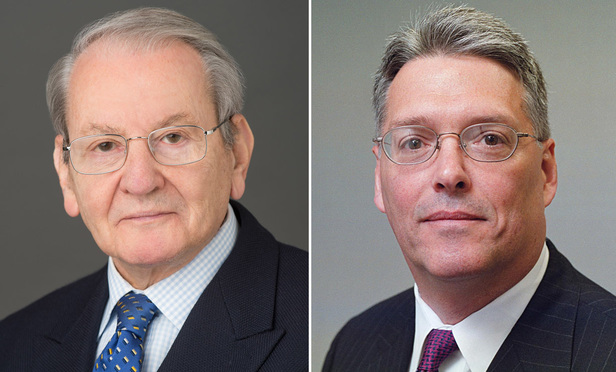 Thomas R. Newman and Steven J. Ahmuty Jr.
Thomas R. Newman and Steven J. Ahmuty Jr. Stare Decisis in Federal and State Courts
In their Appellate Practice column, Thomas R. Newman and Steven J. Ahmuty Jr. provide a refresher on stare decisis principles as described in various cases and sources.
November 03, 2020 at 12:30 PM
8 minute read
June Medical Services v. Russo, 591 U.S. ___, 140 S.Ct 2103 (2020), will probably be remembered by the public at large as the case in which the U.S. Supreme Court ruled unconstitutional a Louisiana state law requiring doctors working in abortion clinics to have "active admitting privileges at a hospital … located not further than thirty miles from the location at which the abortion is performed." The law mirrored a Texas state law that the court found unconstitutional in 2016 in Whole Woman's Health v. Hellerstedt, 579 U.S. ___ , 136 S.Ct __ (2016). For state and federal court litigators, Chief Justice Robert's concurring opinion will also be recalled for its recital of the history of the doctrine of stare decisis, "the legal term for fidelity to precedent" and its present application in federal courts. 140 S.Ct at 2134 (concurring opinion, quoting Black's Law Dictionary).
Quoting 18th century sources as applicable to 21st century litigation, the Chief Justice begins by noting that in 1765 it had "long been 'an established rule to abide by former precedents, where the same points come again in litigation; as well to keep the scale of justice even and steady, and not liable to waver with every new judge's opinion.'" 140 S.Ct at 2134 (concurring opinion; quoting 1 W. Blackstone, Commentaries on the Laws of England 69 [1765]). He then explains that "[t]his principle is grounded in a basic humility that recognizes today's legal issues are often not so different from the questions of yesterday and that we are not the first ones to try to answer them." 140 S.Ct at 2134 (concurring opinion).
This content has been archived. It is available through our partners, LexisNexis® and Bloomberg Law.
To view this content, please continue to their sites.
Not a Lexis Subscriber?
Subscribe Now
Not a Bloomberg Law Subscriber?
Subscribe Now
NOT FOR REPRINT
© 2025 ALM Global, LLC, All Rights Reserved. Request academic re-use from www.copyright.com. All other uses, submit a request to [email protected]. For more information visit Asset & Logo Licensing.
You Might Like
View All
Skadden and Steptoe, Defending Amex GBT, Blasts Biden DOJ's Antitrust Lawsuit Over Merger Proposal
4 minute read
Come Fly With Me: DOJ’s Proposed FARA Amendments and the Tourism Industry
10 minute readLaw Firms Mentioned
Trending Stories
- 1Bribery Case Against Former Lt. Gov. Brian Benjamin Is Dropped
- 2‘Extremely Disturbing’: AI Firms Face Class Action by ‘Taskers’ Exposed to Traumatic Content
- 3State Appeals Court Revives BraunHagey Lawsuit Alleging $4.2M Unlawful Wire to China
- 4Invoking Trump, AG Bonta Reminds Lawyers of Duties to Noncitizens in Plea Dealing
- 522-Count Indictment Is Just the Start of SCOTUSBlog Atty's Legal Problems, Experts Say
Who Got The Work
J. Brugh Lower of Gibbons has entered an appearance for industrial equipment supplier Devco Corporation in a pending trademark infringement lawsuit. The suit, accusing the defendant of selling knock-off Graco products, was filed Dec. 18 in New Jersey District Court by Rivkin Radler on behalf of Graco Inc. and Graco Minnesota. The case, assigned to U.S. District Judge Zahid N. Quraishi, is 3:24-cv-11294, Graco Inc. et al v. Devco Corporation.
Who Got The Work
Rebecca Maller-Stein and Kent A. Yalowitz of Arnold & Porter Kaye Scholer have entered their appearances for Hanaco Venture Capital and its executives, Lior Prosor and David Frankel, in a pending securities lawsuit. The action, filed on Dec. 24 in New York Southern District Court by Zell, Aron & Co. on behalf of Goldeneye Advisors, accuses the defendants of negligently and fraudulently managing the plaintiff's $1 million investment. The case, assigned to U.S. District Judge Vernon S. Broderick, is 1:24-cv-09918, Goldeneye Advisors, LLC v. Hanaco Venture Capital, Ltd. et al.
Who Got The Work
Attorneys from A&O Shearman has stepped in as defense counsel for Toronto-Dominion Bank and other defendants in a pending securities class action. The suit, filed Dec. 11 in New York Southern District Court by Bleichmar Fonti & Auld, accuses the defendants of concealing the bank's 'pervasive' deficiencies in regards to its compliance with the Bank Secrecy Act and the quality of its anti-money laundering controls. The case, assigned to U.S. District Judge Arun Subramanian, is 1:24-cv-09445, Gonzalez v. The Toronto-Dominion Bank et al.
Who Got The Work
Crown Castle International, a Pennsylvania company providing shared communications infrastructure, has turned to Luke D. Wolf of Gordon Rees Scully Mansukhani to fend off a pending breach-of-contract lawsuit. The court action, filed Nov. 25 in Michigan Eastern District Court by Hooper Hathaway PC on behalf of The Town Residences LLC, accuses Crown Castle of failing to transfer approximately $30,000 in utility payments from T-Mobile in breach of a roof-top lease and assignment agreement. The case, assigned to U.S. District Judge Susan K. Declercq, is 2:24-cv-13131, The Town Residences LLC v. T-Mobile US, Inc. et al.
Who Got The Work
Wilfred P. Coronato and Daniel M. Schwartz of McCarter & English have stepped in as defense counsel to Electrolux Home Products Inc. in a pending product liability lawsuit. The court action, filed Nov. 26 in New York Eastern District Court by Poulos Lopiccolo PC and Nagel Rice LLP on behalf of David Stern, alleges that the defendant's refrigerators’ drawers and shelving repeatedly break and fall apart within months after purchase. The case, assigned to U.S. District Judge Joan M. Azrack, is 2:24-cv-08204, Stern v. Electrolux Home Products, Inc.
Featured Firms
Law Offices of Gary Martin Hays & Associates, P.C.
(470) 294-1674
Law Offices of Mark E. Salomone
(857) 444-6468
Smith & Hassler
(713) 739-1250







